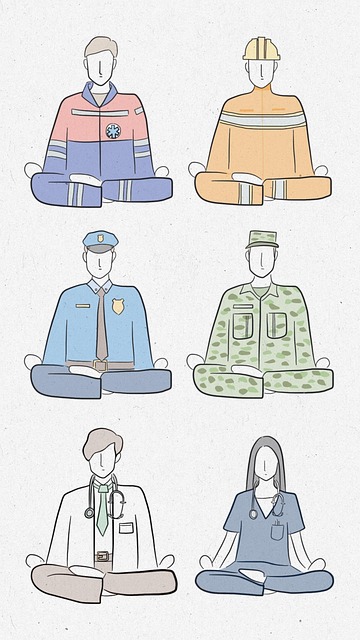Arvada Play Therapy is a recognized approach to childhood emotional well-being, using play and creative expression to process emotions like trauma. It complements traditional talk therapy and promotes early self-care practices. By identifying personal stressors and incorporating mindfulness, self-care, and social skills training, individuals gain effective coping mechanisms and resilience. This holistic approach integrates practical tools into daily life, enhancing overall mental wellness and supporting individuals through challenging times in a safe environment.
In today’s fast-paced world, developing robust coping skills is essential for emotional well-being. This article delves into various aspects of coping skill development, offering insights that can transform lives. From understanding the foundational role of coping skills to exploring innovative approaches like Arvada Play Therapy, we provide practical strategies for navigating stress and building resilience. Learn how identifying personal stressors, practicing mindfulness, and adopting self-care routines can enhance mental health, fostering adaptability in challenging times.
- Understanding Coping Skills: A Foundation for Emotional Well-being
- The Role of Play Therapy in Arvada: Unlocking Children's Resilience
- Identifying Personal Stressors and Triggers
- Building Adaptability: Strategies for Effective Coping
- Practicing Mindfulness and Self-Care for Optimal Mental Health
Understanding Coping Skills: A Foundation for Emotional Well-being

Understanding coping skills is a fundamental aspect of cultivating emotional well-being, and Arvada Play Therapy offers valuable guidance in this regard. These skills empower individuals to navigate life’s challenges with resilience and adaptability. By learning effective coping strategies, one can transform their response to stress, anxiety, or difficult emotions, thereby enhancing overall mental wellness.
Journaling, for instance, is a powerful mental wellness journal exercise that allows individuals to process their thoughts and feelings. This introspective practice provides a safe space to explore emotions, identify triggers, and develop personal strategies for managing them. Similarly, guidance from Arvada Play Therapy can help individuals discover the best practices for stress management through workshops and organizational support, fostering emotional healing processes that are essential for a fulfilling life.
The Role of Play Therapy in Arvada: Unlocking Children's Resilience

In Arvada, play therapy is emerging as a powerful tool to help children navigate their emotions and build resilience. Through playful activities, this therapeutic approach allows young minds to express themselves, process traumatic experiences, and develop healthy coping mechanisms. By integrating toys, games, and imaginative scenarios into the healing process, play therapy provides a safe and engaging environment for children to explore their feelings and enhance their emotional intelligence.
This form of therapy is particularly beneficial for those facing challenges such as anxiety, depression, or past traumas. It not only complements traditional talk therapy but also fosters self-care practices in children at an early age. Moreover, it encourages mental health awareness among both children and their caregivers, empowering them to recognize signs of distress and seek appropriate support. Effective risk assessment remains crucial for mental health professionals facilitating play therapy, ensuring the well-being and progress of each child involved.
Identifying Personal Stressors and Triggers

Recognizing personal stressors and triggers is a pivotal first step in developing effective coping skills through Arvada Play Therapy. This involves becoming attuned to the unique emotional cues and external factors that ignite feelings of stress, anxiety, or distress. By identifying these triggers, individuals can begin to understand their specific needs and vulnerabilities, forming the foundation for targeted interventions.
In the context of mental health professionals, acknowledging personal stressors is crucial for implementing successful stress reduction methods. It allows them to create personalized risk management planning, ensuring they maintain their own emotional well-being while supporting clients. Through this introspective process, therapists can incorporate various emotional well-being promotion techniques into their practice, ultimately enhancing the therapeutic experience and fostering more meaningful connections with clients.
Building Adaptability: Strategies for Effective Coping

In the context of Arvada Play Therapy, building adaptability is a cornerstone of effective coping skills development. Children and adolescents, like adults, need tools to navigate life’s challenges, especially in times of stress or trauma. Play therapy offers a unique space where individuals can express themselves creatively, process difficult emotions, and learn healthy coping strategies. Through this therapeutic approach, clients gain a deeper understanding of their feelings and behaviors, fostering resilience and adaptability.
The goal is not just to manage stress but to build confidence in one’s ability to handle tough situations. This involves teaching practical skills such as mindfulness exercises, problem-solving techniques, and emotional regulation strategies. By integrating these practices into daily life, individuals can enhance their overall well-being and better support themselves during challenging times. Trauma Support Services within play therapy provide a safe environment for clients to process past traumas, thereby promoting personal growth and improved coping abilities.
Practicing Mindfulness and Self-Care for Optimal Mental Health

In today’s fast-paced world, prioritizing mental health is more crucial than ever. Practicing mindfulness and self-care are essential components of maintaining optimal well-being, especially for individuals seeking therapy in Arvada. Mindfulness meditation techniques allow individuals to focus on the present moment, reducing anxiety and stress associated with daily life. Regular practice enhances emotional regulation, enabling better coping mechanisms during challenging situations.
Self-care involves dedicating time to nurture both physical and mental health. This can include engaging in activities like exercise, hobbies, or spending quality time in nature. For those undergoing play therapy in Arvada, incorporating social skills training alongside these practices proves beneficial. Such training fosters healthy interactions and communication, contributing to a robust risk assessment for mental health professionals. By combining mindfulness, self-care, and social skills development, individuals can effectively navigate life’s complexities while nurturing their overall mental health.
Coping skills development is a multifaceted process that, when nurtured, can significantly enhance emotional well-being. From understanding coping mechanisms to leveraging play therapy in Arvada and practicing mindfulness, individuals – especially children – can build resilience and adaptability. By identifying personal stressors and triggers, one can proactively manage mental health and foster a healthier, more balanced life. The strategies outlined in this article, including those specific to Arvada Play Therapy, serve as valuable tools for navigating life’s challenges and cultivating long-term mental fortitude.













